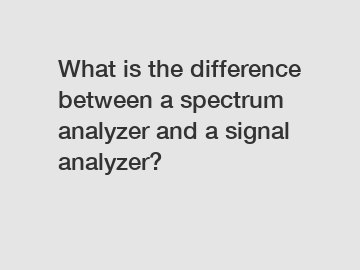What is the difference between a spectrum analyzer and a signal analyzer?
When it comes to analyzing signals in the field of electronics and telecommunications, two common devices used are spectrum analyzers and signal analyzers. While they may sound similar, they serve different purposes and have distinct functionalities. Understanding the difference between these two devices is essential for professionals working in these industries to ensure accurate and efficient signal analysis. In this article, we will explore the key differences between a spectrum analyzer and a signal analyzer.
**Spectrum Analyzer**.
A spectrum analyzer is a device used to measure and display the frequency spectrum of an input signal. It provides a visual representation of the frequency components of a signal, allowing technicians to analyze its amplitude, frequency, and phase characteristics. Spectrum analyzers are commonly used in applications such as RF testing, audio signal analysis, and electromagnetic interference (EMI) troubleshooting.

One of the primary features of a spectrum analyzer is its ability to display signal frequency content in real-time. By capturing and processing signals in the frequency domain, spectrum analyzers can identify any unwanted interference or noise present in a signal. This makes them valuable tools for identifying and resolving signal quality issues, ensuring optimal performance in various electronic systems.
**Signal Analyzer**.
On the other hand, a signal analyzer is a more versatile device that provides a wider range of analysis capabilities beyond frequency spectrum measurement. Signal analyzers are designed to analyze various signal parameters such as amplitude, phase, frequency, modulation, and distortion. They are commonly used in applications such as wireless communication testing, audio analysis, and signal modulation analysis.
Unlike spectrum analyzers, which focus primarily on frequency domain analysis, signal analyzers can analyze signals in both the time and frequency domains. This allows technicians to perform detailed signal analysis to understand the behavior and characteristics of complex signals. Signal analyzers are often used in research and development, production testing, and troubleshooting of electronic devices.
**Key Differences**.
The main difference between a spectrum analyzer and a signal analyzer lies in their primary function and capabilities. Spectrum analyzers are specialized devices that focus on analyzing the frequency spectrum of signals, providing insights into frequency content and interference. In contrast, signal analyzers offer a wider range of analysis features, enabling technicians to analyze signal parameters in both time and frequency domains.
Another key difference is the display format used by these devices. Spectrum analyzers typically display signal frequency content in a spectrum display, showing signal amplitudes as a function of frequency. In comparison, signal analyzers may offer various display options such as time domain, frequency domain, and constellation diagrams, providing a more comprehensive analysis of signal characteristics.
**Conclusion**.
In conclusion, spectrum analyzers and signal analyzers are essential tools for signal analysis in electronics and telecommunications applications. While both devices serve the purpose of analyzing signals, they have distinct functionalities and capabilities that cater to different analysis requirements. Understanding the differences between these devices is crucial for professionals in the field to choose the right tool for their specific applications.
If you have any further questions about spectrum analyzers or signal analyzers, feel free to contact us for more information and assistance with your signal analysis needs.
Are you interested in learning more about Rf Signal Generator, analyzer instrument co, 9 kHz 1.5 GHz 7.5 GHz Analyzer? Contact us today to secure an expert consultation!


